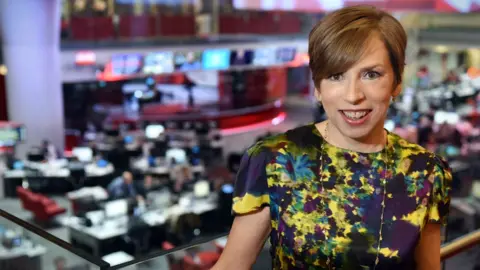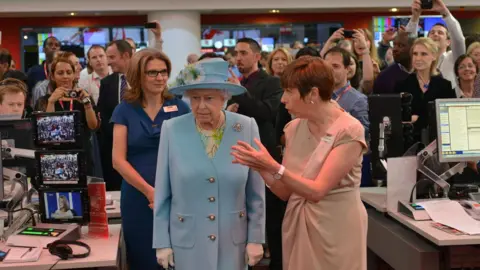BBC's director of news Fran Unsworth to leave the corporation
 JEFF OVERS / BBC
JEFF OVERS / BBCThe BBC's director of news Fran Unsworth is to leave the corporation early next year, it has been announced.
A lifelong BBC employee, she took charge of the BBC's news and current affairs division in 2018.
She is also one of the 12 people who sit on the BBC board, which sets the broadcaster's overall strategy.
Unsworth, who will leave in January, said it had been "a great privilege" to work for the BBC for more than 40 years.
"I have had a ringside seat at some momentous events, including the Falklands War, the Troubles in Northern Ireland, wars in the Middle East, the death of Princess Diana, 9/11 and countless general elections," she said in a statement.
"The jobs I've done have not always been easy. Undoubtedly, some were more fun than others. But I am proud to have done all of them - and to work for an organisation which has such a vital and precious role in the UK and around the world.
"The BBC is free of commercial and proprietorial pressure. Our bosses are the audiences we serve. I am honoured to have been part of it."
'Absolute independence'
The 63-year-old's resignation comes at a time of upheaval for the BBC's news division. The department is undergoing a major restructure, which will result in about 250 job cuts, with many jobs moving out of London.
Unsworth, who earned £340,000 last year, has also been caught up in a row over the proposed appointment of Jess Brammar - a former deputy editor of Newsnight and editor-in-chief of the Huffington Post - to a senior role in BBC News.
In July, The Financial Times reported that Sir Robbie Gibb, Theresa May's former communications director who now also sits on the BBC board, had texted Unsworth to voice concerns about the appointment, saying Brammar's past criticism of the government could damage the BBC's reputation for impartiality.
The exchange has not been officially confirmed, but when asked about the row in a recent interview, Unsworth stressed that the BBC recruitment process was "independent" and "free from any corporate interest".

"Obviously, there are some people who feel we are subject to influence one way or the other," she told the Westminster Media Forum.
"But it comes back to the robustness of our editorial processes, people who understand their role as a public service provider, and the need for absolute independence and impartiality in what they do.
"We have to withstand any pressure that comes from anywhere, and I think we do that pretty well in general."
'Testing period'
Unsworth weathered criticisms of BBC bias from both the Labour and Conservative parties during Brexit, and steered the BBC's coverage of the Covid-19 pandemic.
"Fran has taken BBC News through one of the most testing periods in its history, providing a vital service during the Covid-19 pandemic, when record audiences turned to BBC News," director general Tim Davie said.
"She has led BBC coverage during a period of momentous events at home and abroad, alongside leading a huge modernisation programme to reshape BBC News. She will be greatly missed by everyone at the BBC."
She has also had to deal with several BBC crises, such as when BBC Breakfast presenter Naga Munchetty was found to have breached editorial guidelines for criticising Donald Trump's tweets in 2019.
Cliff Richard apology
After the BBC editorial complaints unit ruled against Munchetty, Unsworth - along with director general Tony Hall and the rest of the executive board - described the ruling as deeply flawed.
They said the BBC was "not impartial on racism" and that she was "completely justified" in making her comments.
Unsworth also dealt with the fallout from revelations about equal pay, including the resignation of BBC China editor Carrie Gracie. And while deputy director of BBC News in 2014, she was ultimately responsible for the decision to film a police raid on the home of Sir Cliff Richard.
The BBC was later forced to pay the star £2m after he won a privacy case over the reports.
Unsworth apologised to Sir Cliff and said: "In retrospect, there are things we would have done differently."
She began her broadcasting career in local radio in Bristol and Leicester, before becoming a producer on BBC Radio 1's Newsbeat.
She moved to BBC Radio 4's The World At One and PM, and worked as a radio producer in Washington during the Gulf War.
She spent periods working on both the One O'Clock and Six O'Clock News as a producer and editor, and was head of the BBC's political programming and the first female director of the BBC World Service.
The process to appoint her successor as head of news will begin shortly, the BBC said.
